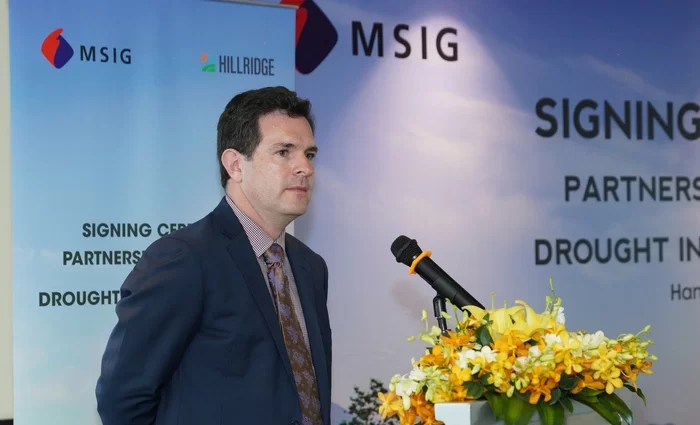Hillridge – An insurance technology company from Australia has just launched a drought insurance product in Vietnam. Unlike traditional agricultural insurance, this type of insurance is set up on a digital platform and has almost completely changed the way of setting up and providing an agricultural insurance service. There will be no scene when crop failure has to go to count each tree and child to measure damage, calculate compensation, but all from product selection, price level, contract signing, damage compensation calculation are based on global data. demand and online.
Mr. Dale Schilling – CEO of Hillridge explained, “The way we build our products is by using technologies to approach and measure weather events. Through an online platform, farmers directly get insurance quotes online based on actual data, choosing the right insurance package for their farm size. The policy value will be determined before the insurance period begins and people only have to pay when the conditions of the policy are met. Farmers will be entitled to insurance that covers up to 75% of the value of their agricultural products, if, during the registration period, the rainfall in their agricultural production area falls to a drought level for 10 years, based on data on the amount of agricultural production. rain from the CHIRPS global satellite weather data set.

– What are the advantages of digital insurance products, sir?
Mr. Dale Schilling: The biggest advantage is that the cost is low and it is accessible to farmers anywhere, regardless of scale. When it comes to digital products, that means automation and less human contact, which reduces additional costs.
If in the past, small-scale farmers could not have access to financial insurance products like large enterprises, now technology allows us to reach more different groups of customers.
Whether smallholder farmers, cooperatives or large enterprises, they all have similar concerns as a tool to protect against weather risks. Digital technology has given birth to the way insurance and its implementation or compensation are based on digital data.
– In Vietnam, the majority are smallholder farmers, there are few large-scale establishments that have enough finance for insurance costs. So, where are the crops that agricultural insurance like drought can focus on exploiting services?.
Mr. Dale Schilling: In our application there is a list of many crops such as coffee, durian, cocoa, grapefruit etc and there will be no restrictions at all. In the Central Highlands, there are crops such as coffee, cocoa, durian and pepper. The Mekong Delta region is a very large agricultural production place of the country with rice and many kinds of fruit trees. The digital technology platform allows businesses to reach all customers with many different types of subtree objects.
– In the past, many agricultural insurance models in Vietnam have failed. One of the main reasons is that farmers have not found the right financial services for them. Is this the right time to develop agricultural financial products such as insurance?
Mr. Dale Schilling: Such failures, I think, are because the models developed in the West, the US, and Australia when brought into Vietnam are not completely suitable, especially with the characteristics of Vietnamese agriculture. . With digital technology, we take a differentiated product approach. Like a weather insurance product, we know that the weather affects agriculture but it will have different degrees of impact and different consequences, so only digital technology allows to build each policy. a separate field suitable for each farmer according to each type of seedling, size and time.
We hope that the new approach through a digital technology platform will be effective for the specifics of Vietnam and we will fine-tune the product to suit the needs of our customers.
– Most of the Vietnamese farmers do farming and selling in the traditional way. For them, the use of financial products like farmers in advanced countries. After decades of development, in your opinion, is it time for Vietnamese farmers to have a large enough demand for financial products for businesses to exploit?
Mr. Dale Schilling: I think this is the perfect time, in markets like the US or Australia… we have products for farmers like forward selling, they get a lot of money. profits when selling futures, however, the risk also increases, so they need to offset by defensive measures such as insurance.
We see that there are many opportunities to invest in Vietnam at this time. We have cooperated with a cooperative in Binh Phuoc. Previously, they were just a farmer producing and growing durian, but they found that they could double their profits if they exported to China. However, they cannot do it alone, they have to form cooperatives and invest a lot in technology, have logistics services and insurance contracts too. And with the support of service partners, the agricultural establishment has been very successful.
I think the market in Vietnam and Vietnam’s agriculture have reached a point where they can develop financial products such as insurance and many others.
We see that farmers now have to take care of many aspects, in addition to production, sales, marketing, operations, personnel management and risk management, they act as an executive director. for their own company.
As for agricultural insurance, if it wants to promote development to support farmers, the government can partially subsidize it. I hope the government can consider extending that subsidy to all kinds of crop, agricultural goods for farmers. This is very important for farmers, giving them more confidence and reducing costs when buying insurance.
